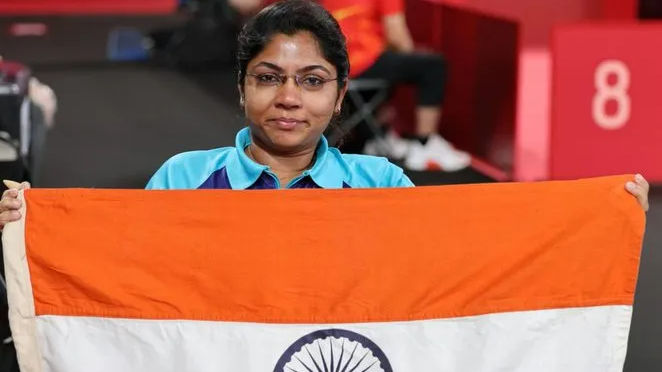Indian para table tennis player Bhavina Patel on Sunday became the country’s first-ever Paralympic silver medallist in the sport, after losing 3-0 to China’s world number one Zhou Ying the class 4 final at the ongoing Tokyo Games. This is also India’s first medal at the ongoing Paralympics.
Bhavina stormed into the final after a hard-fought 3-2 win over China’s world number three Miao Zhang in the semifinal on Saturday. She also defeated Rio Paralympic gold medallist Serbian Borislava Peric Rankovic in the quarterfinal as she kept deying expectations.
But her impressive run came to an end against the two-time gold medallist Zhou with a 7-11, 5-11, 6-11 loss in 19 minutes. Patel also lost to Zhou, who is among the most decorated para table-tennis players, in her frist group match earlier this week.
Zhou, who has won five Paralympic medals including two golds as well as six World Championship medals, did not allow Bhavina to settle into her game.
She stormed into the lead after the scores were level at 3-3 in the first game, although Bhavina managed to keep within touching distance for a while. The second game was all Zhou, as she raced to a 7-1 lead before sealing it 11-5.
Bhavina tried to rally back in the third game, as she kept the score at 5-5, but ultimately couldn’t keep pace with her opponent, who clinched another gold medal with a backhand shot.
“She has made us proud, we will give her a grand welcome on her return,” Bhavina’s father Hasmukhbhai Patel told ANI in Mehsana, Gujarat, where her friends and family members erupted with joy after her historic medal was confirmed.
Also Read | I proved nothing is impossible: Indian Paralympic paddler Bhavina Patel
Bhavina is the daughter of a small-time shopkeeper from Sundhiya village in Gurjarat’s Mehsana district and was not even considered a bright medal prospect for her maiden Paralympic appearance.
In para table tennis, classes 1-5 are for wheelchair athletes. Athletes in Class 4 category have fair sitting balance and fully functional arms and hands. Their impairment may be due to a lower spinal-cord lesion or cerebral palsy.







